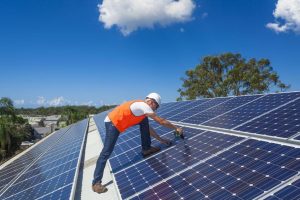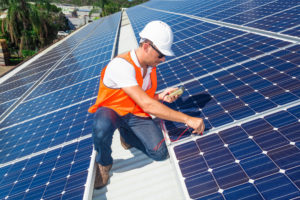The solar industry is booming, and skilled solar panel installers play a crucial role in successfully implementing solar power systems. In this article, we will explore the necessary skills and qualifications for solar panel installers and the career progression opportunities available in this exciting field.
Contents
- 1 Key Takeaways
- 2 Understanding the Solar Panel Installer Job Description
- 3 Becoming a Solar Panel Installer
- 4 Career Progression and Advancement Opportunities
- 5 Case Study: Pathway to Becoming a Skilled Solar Panel Installer
- 6 Expert Insights From Our Solar Panel Installers About Key Qualifications and Career Progression
- 7 Conclusion
Key Takeaways
- Understanding the role of a solar panel installer and the key qualifications and skills required is essential for success in the field.
- Becoming a skilled solar panel installer involves obtaining relevant education and training, gaining hands-on experience, and continuously learning about advancements in the industry.
- There are various career progression opportunities for solar panel installers, including becoming a lead installer, transitioning to a solar system designer role, exploring sales and business development, or starting their own solar installation business.
Understanding the Solar Panel Installer Job Description
The role of a solar panel installer is crucial in the successful implementation of solar power systems. These professionals are responsible for installing solar panels, ensuring their functionality, and complying with electrical codes and regulations. To excel in this field, it is essential to understand the job description and the skills required for the role.
Key Qualifications and Skills
Certain qualifications and skills are necessary to become a proficient solar panel installer. These include technical expertise, safety protocols, problem-solving abilities, attention to detail, customer service skills, time management, and physical fitness.
Technical Expertise
Having technical expertise is crucial for a solar panel installer. They need to be proficient in various installation techniques, such as proper mounting, wiring, and connection of solar panels. A comprehensive understanding of electrical systems is also necessary to safely integrate solar panels into existing infrastructure. Moreover, familiarity with electrical codes and regulations ensures installation compliance and safety.
Safety Protocols
Safety protocols are of utmost importance in this profession. Solar panel installers must adhere to strict guidelines, use appropriate personal protective equipment (PPE), and implement safe working practices. Since installations often involve working at heights, expertise in this area is essential.
Problem-Solving Abilities
Problem-solving skills are vital for solar panel installers. They encounter installation challenges, from identifying and rectifying wiring faults to addressing panel malfunctions. Troubleshooting and resolving issues efficiently contributes to successful installations and optimal system performance.
Attention to Detail
Attention to detail is critical in solar panel installations. Solar panel installers must demonstrate precision and accuracy in measurements, proper alignment of panels, and secure mounting. These meticulous practices maximize energy production, ensure structural integrity, and promote long-term durability and reliability of the solar panel system.
Customer Service Skills
Customer service skills are valuable assets for solar panel installers. Effective communication and professionalism in interacting with clients are essential. Solar panel installers need to address clients’ questions and concerns and provide guidance on the operation and maintenance of solar panel systems.
Time Management
Time management is crucial for solar panel installers to meet project deadlines and ensure timely completion of installations. Efficiently organizing tasks, coordinating with team members, and prioritizing work contribute to delivering high-quality installations within designated timeframes.
Physical Fitness
Physical fitness is important for solar panel installers due to the nature of their work. Installations often involve working in various weather conditions, heights, and physically demanding environments. Being physically fit enables them to perform their duties effectively and safely.

Becoming a Solar Panel Installer
Embarking on a solar panel installer career involves a combination of education, training, and hands-on experience. To become a skilled solar panel installer, individuals can follow several steps.
Education and Training
Obtaining relevant education and training is essential for aspiring solar panel installers. Individuals receive comprehensive education on solar panel technology, installation techniques, electrical systems, and safety protocols by enrolling in vocational training programs specifically designed for solar panel installation. These programs equip individuals with the necessary knowledge to perform installations effectively and ensure compliance with industry standards.
Another pathway is participating in apprenticeship programs offered by solar installation companies or trade organizations. These programs combine classroom instruction with practical, on-the-job training. Through apprenticeships, individuals gain hands-on experience under the guidance of experienced professionals, learning the nuances of solar panel installations.
Additionally, obtaining industry-recognized certifications, such as those offered by the North American Board of Certified Energy Practitioners (NABCEP), enhances the credentials of solar panel installers. These certifications validate the knowledge and skills necessary for successful solar panel installations.
Gaining Experience
Hands-on experience is invaluable for solar panel installers. Building practical skills through experience contributes to their effectiveness and expertise.
Seeking entry-level positions with reputable solar installation companies or contractors provides opportunities to gain hands-on experience and learn from experienced professionals. Starting as an assistant or junior installer allows individuals to learn the intricacies of solar panel installations, acquire practical skills, and gradually take on more responsibilities.
On-the-job training provided by employers further enhances the expertise of solar panel installers. This training covers various aspects of installations, including proper wiring, panel mounting, system connection, and quality assurance. Through on-the-job training, individuals refine their skills and gain exposure to real-world scenarios, further preparing them for their role as solar panel installers.
Continued learning is essential to stay updated with the latest advancements in solar technology and installation practices. Participating in continuing education programs, workshops, and industry conferences helps expand knowledge and skills. It also provides opportunities to learn about updates to electrical codes and regulations relevant to solar panel installations.

Career Progression and Advancement Opportunities
A career as a solar panel installer offers various paths for professional growth and advancement. Solar panel installers can explore different avenues within the industry based on their skills, interests, and aspirations.
Lead Installer
One potential career progression path is becoming a lead installer. With experience and expertise, solar panel installers can assume leadership roles, overseeing installation teams and managing projects. In this capacity, their expertise in coordinating installations effectively becomes crucial for ensuring successful project outcomes.
Solar System Designer
Another advancement opportunity is transitioning to a solar system designer role. Solar system designers utilize their knowledge and experience to design customized solar panel systems. They analyze energy requirements, assess site feasibility, create blueprints, and optimize system performance. This role requires a deep understanding of solar panel technology, electrical systems, and system design principles.
Sales and Business Development
Sales and business development roles are also options for solar panel installers with excellent communication and interpersonal skills. These roles involve engaging with clients, educating them about solar panel systems, analyzing their energy needs, and providing tailored solutions. Sales and business development professionals play a crucial role in promoting renewable energy and facilitating the adoption of solar panel systems.
Entrepreneurship
For individuals with an entrepreneurial spirit, starting their own solar installation business can be a rewarding path. Owning a business in the solar industry allows individuals to shape their company’s vision, establish relationships with clients, and contribute to the growth of renewable energy in their community. This path requires technical expertise, business acumen, and strategic planning.
Case Study: Pathway to Becoming a Skilled Solar Panel Installer
Background
At Solar Panels Network USA, we are committed to fostering the growth and development of skilled solar panel installers. Recognizing the critical role these professionals play in the successful deployment of solar power systems, we have developed comprehensive training programs and career progression pathways to support aspiring installers. This case study highlights the journey of our solar panel installers, detailing the steps involved in acquiring the necessary skills and advancing within the industry.
Project Overview
Our training programs encompass a blend of formal education, hands-on experience, and continuous learning opportunities. We focus on equipping individuals with the technical expertise, safety protocols, and problem-solving abilities essential for excelling as solar panel installers. Additionally, we provide clear career progression pathways, enabling installers to explore various roles within the solar industry.
Implementation
Education and Training
- Vocational Training Programs: We offer vocational training programs specifically designed for solar panel installation. These programs cover essential topics such as solar panel technology, installation techniques, electrical systems, and safety protocols. Participants gain a comprehensive understanding of the theoretical aspects of solar panel installation, preparing them for practical application.
- Apprenticeships: Our apprenticeship programs combine classroom instruction with hands-on training. Participants work alongside experienced professionals, gaining practical experience in real-world scenarios. This immersive approach allows aspiring installers to learn the intricacies of the trade, from proper mounting and wiring to system integration and troubleshooting.
- Certifications: To enhance the credentials of our installers, we encourage them to obtain industry-recognized certifications, such as those offered by the North American Board of Certified Energy Practitioners (NABCEP). These certifications validate their knowledge and skills, providing a competitive edge in the job market.
Gaining Experience
- Entry-Level Positions: We facilitate entry-level positions with reputable solar installation companies. This allows individuals to gain hands-on experience and learn from seasoned professionals. Starting as assistants or junior installers, they gradually take on more responsibilities, building their expertise and confidence.
- On-the-Job Training: Employers provide on-the-job training to further enhance the skills of our installers. This training covers various aspects of installations, including wiring, panel mounting, system connection, and quality assurance. By working on diverse projects, installers refine their skills and gain exposure to different installation scenarios.
- Continuing Education: We emphasize the importance of continuous learning. Installers participate in workshops, industry conferences, and continuing education programs to stay updated with the latest advancements in solar technology and installation practices. This commitment to learning ensures they remain at the forefront of industry developments.
Career Progression and Advancement
- Lead Installer: With experience and expertise, installers can advance to lead installer roles. In this capacity, they oversee installation teams, manage projects, and ensure successful outcomes. Their leadership skills and technical proficiency are crucial for coordinating complex installations.
- Solar System Designer: Installers with a deep understanding of solar technology and system design can transition to roles as solar system designers. These professionals analyze energy requirements, assess site feasibility, and create customized solar panel system designs. Their expertise optimizes system performance and ensures client satisfaction.
- Sales and Business Development: Installers with excellent communication and interpersonal skills can explore sales and business development roles. These positions involve engaging with clients, educating them about solar panel systems, and providing tailored solutions. Sales professionals play a vital role in promoting renewable energy and driving market adoption.
- Entrepreneurship: For those with an entrepreneurial spirit, starting a solar installation business is a rewarding path. Entrepreneurs shape their company’s vision, establish client relationships, and contribute to the growth of renewable energy in their communities. This path requires technical expertise, business acumen, and strategic planning.
Results
- Skill Development: Our comprehensive training programs and hands-on experience initiatives have successfully developed skilled solar panel installers. Participants acquire the technical knowledge, safety protocols, and problem-solving abilities necessary for excelling in their roles.
- Career Advancement: The clear career progression pathways we provide enable installers to explore various roles within the industry. Whether becoming lead installers, transitioning to system design, or pursuing sales and business development, our installers have diverse opportunities for professional growth.
- Industry Impact: By fostering a skilled workforce, we contribute to the overall growth and sustainability of the solar industry. Our installers play a vital role in implementing efficient and effective solar power systems, promoting the adoption of renewable energy, and supporting the transition to a greener future.
Summary
This case study highlights the pathway to becoming a skilled solar panel installer at Solar Panels Network USA. Through a combination of education, hands-on experience, and continuous learning, our installers acquire the necessary skills to excel in their roles. The clear career progression pathways we provide enable installers to explore diverse opportunities within the industry, contributing to their professional growth and the advancement of the solar sector. By fostering a skilled workforce, we support the successful implementation of solar power systems and promote the adoption of renewable energy.
Expert Insights From Our Solar Panel Installers About Key Qualifications and Career Progression
Becoming a solar panel installer requires more than just technical know-how. You need to have a keen eye for detail, a solid understanding of safety protocols, and excellent problem-solving skills to handle unexpected challenges on the job.
Senior Solar Installation Technician
Hands-on experience is invaluable in this field. It’s one thing to learn about solar panel installation in a classroom, but real-world experience under the guidance of seasoned professionals is where you truly hone your skills.
Lead Solar Installer
Career progression in the solar industry is very promising. With the right skills and dedication, you can move from an installer role to positions like system designer or even start your own solar installation business.
Solar Energy Consultant
Conclusion
Solar panel installers possess a unique skill set that drives the successful implementation of solar power systems. Their qualifications, skills, and experience contribute to installing efficient and effective solar panel systems. Individuals can embark on a fulfilling career as solar panel installers by pursuing relevant education, gaining hands-on experience, and continuously learning. The industry offers various career progression and advancement opportunities, including leadership roles, solar system design positions, sales and business development, and even entrepreneurship. As the world transitions toward a more sustainable future, skilled solar panel installers play a vital role in harnessing the sun’s power and promoting the adoption of renewable energy.
About the Author
Solar Panels Network USA stands at the forefront of solar energy solutions, driven by a team of seasoned solar engineers and energy consultants. With over decades of experience in delivering high-quality solar installations and maintenance, we are committed to promoting sustainable energy through customer-centric, tailored solutions. Our articles reflect this commitment, crafted collaboratively by experts to provide accurate, up-to-date insights into solar technology, ensuring our readers are well-informed and empowered in their solar energy decisions.

